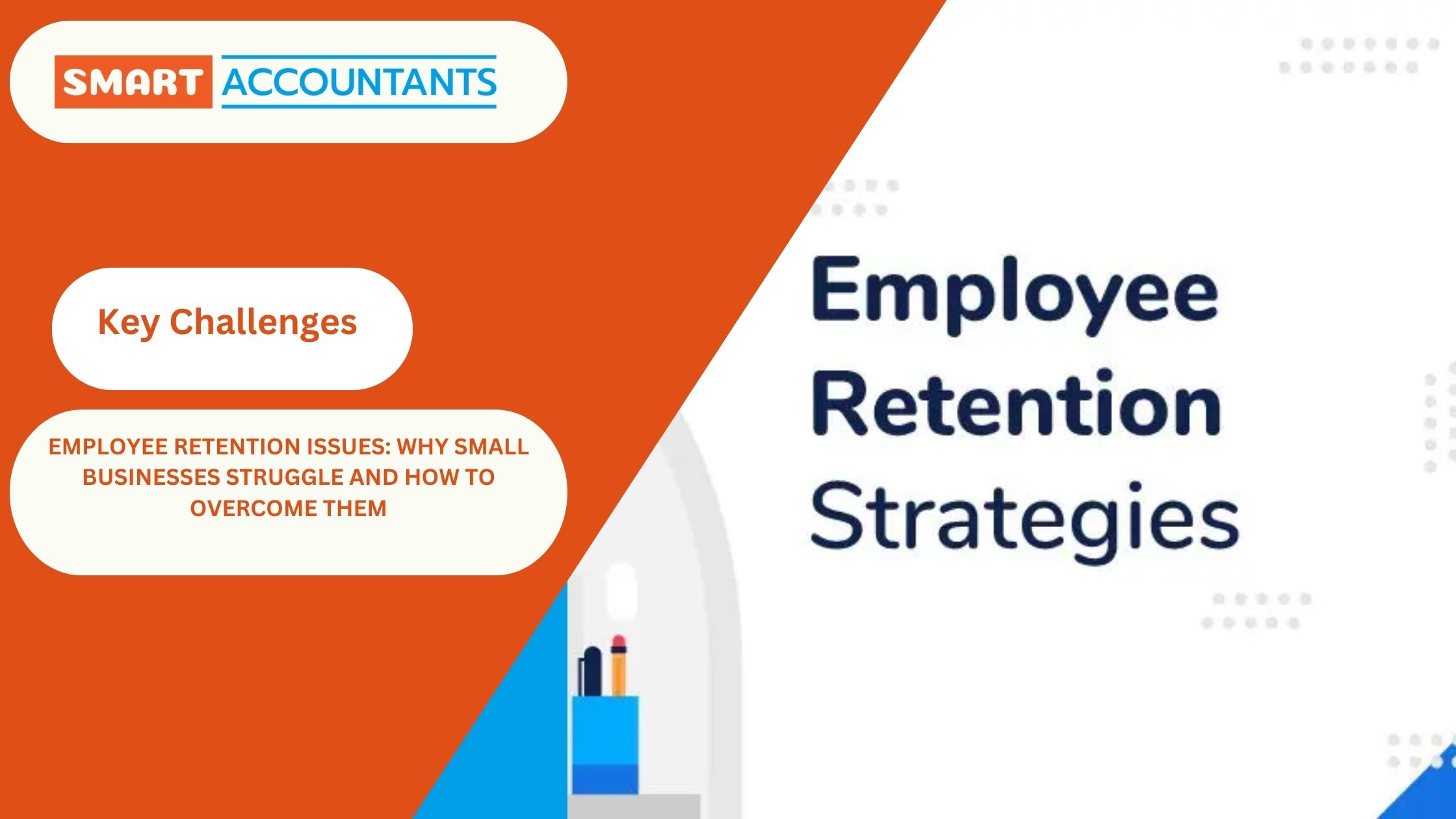Employee retention is a critical issue for many small businesses, especially in today’s competitive job market. When employees leave, businesses not only face the cost of hiring and training replacements but also suffer from lost productivity and lower morale within the team. Unfortunately, small businesses often face unique challenges in retaining their top talent, from limited resources to high turnover rates.

In this article, we’ll explore the common employee retention issues faced by small businesses and offer practical solutions that can help improve retention, fostering a loyal and engaged workforce. By integrating these strategies with effective accounting, bookkeeping, and tax planning services, small businesses can ensure that they not only retain employees but also maintain strong financial health.
What Are the Key Employee Retention Issues?
Before diving into the solutions, it’s important to understand the common reasons why small businesses struggle with employee retention. Let’s look at the main retention challenges and their underlying causes:
1. Inadequate Compensation and Benefits
One of the most straightforward reasons employees leave is because they feel they are not being compensated fairly for their skills and contributions. Small businesses may struggle to offer salaries that match those of larger competitors, which can lead to dissatisfaction and, eventually, turnover.
Impact on the Business:
Inadequate compensation can lead to high turnover rates, which in turn can result in significant recruiting and training costs. The loss of skilled employees also impacts productivity and the business’s overall performance.
2. Lack of Career Growth Opportunities
Employees who feel stuck in their current roles, with no opportunity for advancement, are more likely to leave. Career growth is essential for employee satisfaction and long-term retention. Small businesses sometimes fail to provide clear paths for career development, especially when resources are limited.
Impact on the Business:
Lack of growth opportunities can lead to disengagement and a sense of stagnation among employees. This often results in lower morale, decreased productivity, and higher turnover rates.
3. Poor Work-Life Balance
Work-life balance has become a key factor in employee retention. Small businesses often have fewer resources to offer flexible working hours or remote work options, making it harder for them to compete with larger companies that provide such benefits.
Impact on the Business:
Employees who struggle to balance work with personal life often experience burnout, leading to disengagement and, eventually, resignation. Offering flexibility where possible can enhance retention by fostering a healthy work-life balance.
4. Lack of Recognition and Appreciation
Employees who feel their hard work is not appreciated are more likely to leave for a company that values their contributions. Recognition doesn’t always have to be monetary—it can come in the form of praise, awards, or other non-financial incentives.
Impact on the Business:
When employees don’t feel valued, their productivity can drop, and they may lose their motivation to contribute. This leads to poor employee engagement and higher turnover.
5. Unclear Job Expectations and Lack of Support
Small businesses often lack the systems and structures to properly onboard and train employees, leading to confusion around job expectations. Employees who are unsure of their roles or feel unsupported in their work are more likely to leave.
Impact on the Business:
Unclear job roles and inadequate support can cause frustration and uncertainty, leading to poor performance and increased turnover. Onboarding programs and clear communication can help mitigate this issue.

How Can Small Businesses Overcome Employee Retention Issues?
Addressing these common employee retention issues requires a multifaceted approach. Small businesses can implement the following strategies to improve retention and ensure they keep their top talent.
1. Offer Competitive Compensation and Benefits
While small businesses may not be able to match the salaries of larger corporations, they can still offer competitive compensation packages that align with industry standards. Additionally, benefits such as health insurance, retirement plans, and performance bonuses can significantly enhance employee satisfaction.
Pro Tip:
Small businesses can also offer unique benefits that larger companies might not, such as more flexible working arrangements, casual work environments, or the opportunity to take on diverse roles and responsibilities. These benefits can add significant value to the employee experience.
2. Implement Career Development Programs
Providing employees with opportunities to develop their skills and advance in their careers is key to retaining top talent. Small businesses can invest in training programs, mentorship opportunities, and regular performance reviews to help employees grow within the company.
Pro Tip:
Encourage employees to pursue relevant certifications, attend workshops, or take part in online courses. Not only does this contribute to career growth, but it also benefits the business by enhancing the skills of the workforce.
3. Prioritize Work-Life Balance
Offering flexible work arrangements, such as remote work options or flexible hours, can significantly improve employee retention. Small businesses can also foster a culture that encourages employees to take breaks, use their vacation time, and avoid excessive overtime.
Pro Tip:
Implementing policies that prioritize employee well-being and offering work-from-home options, where feasible, can go a long way in enhancing retention and reducing burnout.
4. Foster a Culture of Recognition and Appreciation
Employees who feel appreciated are more likely to stay with a company. Small businesses can implement low-cost, high-impact recognition programs, such as employee of the month awards, personalized thank-you notes, or small tokens of appreciation.
Pro Tip:
Publicly recognize employees for their accomplishments during meetings or through internal communications. This builds morale and motivates others to excel.
5. Improve Onboarding and Training Processes
A smooth and comprehensive onboarding process can make a significant difference in employee retention. Ensure that new hires have clear expectations and receive the support they need to succeed in their roles. Ongoing training and development are also crucial for employee satisfaction.
Pro Tip:
Invest in efficient onboarding programs and offer mentorship opportunities to new hires. This creates a sense of belonging and helps employees feel confident in their roles from the start.
6. Use Accounting and Bookkeeping Services to Streamline Financial Management
Small businesses can use accounting services to better manage their budgets and cash flow, which in turn helps them allocate resources for employee retention efforts. Bookkeeping services can ensure that your financial records are up to date, allowing you to make informed decisions about employee compensation and benefits.
Pro Tip:
Outsourcing accounting and bookkeeping services can help you save time and reduce the risk of errors, freeing up resources that can be reinvested in employee retention strategies.
7. Leverage Tax Planning Services for Financial Efficiency
Tax planning services can help small businesses optimize their financial strategies, ensuring that they can allocate funds to employee programs without negatively impacting their bottom line. By taking advantage of tax-saving opportunities, businesses can improve their financial health and offer better compensation and benefits to employees.
Pro Tip:
Consulting with a tax planning service can help you identify tax credits, deductions, and other opportunities to reduce your tax liability, giving you more financial flexibility to invest in employee retention.

Conclusion: Retain Your Top Talent and Ensure Long-Term Success
Employee retention is a critical challenge for small businesses, but with the right strategies in place, it’s possible to overcome these obstacles. By offering competitive compensation, fostering career growth, promoting work-life balance, and improving recognition, small businesses can build a loyal and engaged workforce.
Incorporating accounting, bookkeeping, and tax planning services into your business operations can also help streamline your financial processes, giving you the resources needed to support these retention strategies. With the right approach, you can retain top talent, reduce turnover costs, and set your business up for long-term success.
For small businesses looking to improve employee retention and streamline their financial management, it’s essential to consider how accounting services, bookkeeping services, and tax planning services can play a vital role in supporting these efforts. Don’t let employee turnover impact your business—take proactive steps to foster a loyal, motivated workforce.






